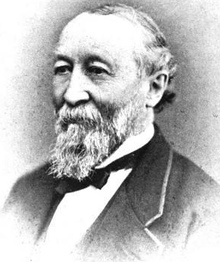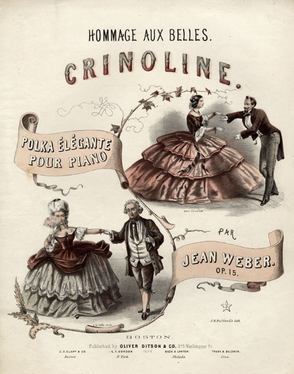Oliver Ditson
Oliver Ditson | |
|---|---|
 | |
| Born | October 20, 1811 Boston, Massachusetts |
| Died | December 21, 1888 (aged 77) Boston, Massachusetts |
| Nationality | American |
| Occupation | Music publisher |
| Known for | Pioneer of music publishing in America |
| Children | 1 |
| Relatives | Alice M. Ditson (daughter-in-law) |
| Signature | |
Oliver Ditson (October 20, 1811 – December 21, 1888) was an American businessman and founder of Oliver Ditson and Company, one of the major music publishing houses of the late 19th century.[1]
Early life and career
Oliver Ditson was born in
In 1823, just out of grammar school, Oliver became an employee of Col. Samuel Hale Parker, father of J.C.D. Parker, the organist and composer. Col. Parker owned a book store on Washington street, near Franklin Street in Boston, and kept in addition to his regular stock a few pieces of music. At the time the Waverley novels were making their appearance and Col. Parker was republishing them as rapidly as they could be gotten from England.[2]
Oliver left the bookstore to master the printer's trade. About 1834, fire destroyed the store of Col. Parker. With what was saved he moved with his now indispensable young friend into a wooden building on Washington street, near School street, and later took a single counter in the famous 'Old Corner Bookstore,' then kept by William D. Ticknor in the gambrel roofed building erected in 1712, at the northwest corner of Washington and School streets. At this location, in 1834, the firm of Parker & Ditson was formed. Mr. Ditson was then twenty-three, and changed it into a music store.
In 1840, Ditson bought out Col. Parker's interest and carried on the business of music seller and publisher under the name of Oliver Ditson.
He acquired the Oliver Ditson and Company moniker in 1857 when he began collaborating with
Ditson's company published the first American edition of
In 1858, Ditson purchased Dwight's Journal of Music, a serious musical journal.
During the American Civil War, Ditson released a number of popular songs, including "Battle Hymn of the Republic" and "Tenting on the Old Camp Ground".
Death
On December 21, 1888, Oliver Ditson, the pioneer of music publishing in America, died at his home in Boston at the age of seventy-seven.[2][3]
Published by Ditson
- Mandolin, guitar, and vocal music by Clara Ross
- Songs by Dagmar de Corval Rybner
- Songs, piano pieces, and musical readings by Lalla Ryckoff
- Music by Sophie Seipt
- Hymns by Lillian Tait Sheldon
- Racquet Galop and other piano pieces by Kate Simmons
- Organ and vocal works by Fannie Morris Spencer
- American editions of Edvard Grieg's piano works, edited by Bertha Tapper
- Biographical Sketches of Eminent Musical Composers by Levina Buoncuore Urbino 1876 Internet Archive
- Compositions for rhythm band by author and music educator J. Lilian Vandevere
- Piano pedagogy pieces by Margaret Wigham
Gallery
-
Sheet music for Quadrille Militaire "Les Hussards" by Charles A. White published by Oliver Ditson & Co., 277 Washington Street, Boston, 1854
-
Sheet music for Durang's Horn Pipe published by Oliver Ditson, in Washington Street, Boston 19th century
-
Former Oliver Ditson Company building, 166 Terrace Street, in the Mission Hill neighborhood of Roxbury, Massachusetts, later gutted and re-built as luxury apartments.[4] Building inscription reads "Oliver Ditson Co. 1835-1925".[5][6]
References
General
- Cornelius, Steven Harry (2004). Music of the Civil War Era. .
- Horn, David (2003). "Oliver Ditson and Company". In John Shepherd; David Horn; Dave Laing; Paul Oliver; .
Inline
- .
- ^ a b c Liebling, Leonard, ed. (February 24, 1915). "History of Oliver Ditson Company". Musical Courier. Vol. 70, no. 8. New York. p. 8. Archived from the original on March 20, 2015. Retrieved August 21, 2012 – via Peter H. Adams.
- ^ "Sharp Scythe". The Boston Globe. December 22, 1888. p. 1. Retrieved December 6, 2021 – via Newspapers.com.
- ^ "Mayor Menino Joins Mission Hill Community to Celebrate New Housing in Renovated Mill Buildings". City of Boston (Press release). March 29, 2010. Archived from the original on March 4, 2016. Retrieved March 12, 2013 – via Wayback Machine.
- ^ Oliver Lofts website
- ^ "Historic Boston Incorporated 1999 Preservation Revolving Fund Casebook: Property Entries Online". Historic Boston. Archived from the original on March 26, 2015. Retrieved March 12, 2013.
External links
- "Profile: Ditson", IMSLP.org. International Music Score Library Project (IMSLP: Petrucci Music Library)
- Temperance melodeon. Boston: O. Ditson, 1850.
- https://www.flickr.com/photos/boston_public_library/2492686114
- https://www.flickr.com/photos/boston_public_library/2492686298



![Former Oliver Ditson Company building, 166 Terrace Street, in the Mission Hill neighborhood of Roxbury, Massachusetts, later gutted and re-built as luxury apartments.[4] Building inscription reads "Oliver Ditson Co. 1835-1925".[5][6]](http://upload.wikimedia.org/wikipedia/commons/thumb/0/0d/Ditson_Bldg_Boston.JPG/500px-Ditson_Bldg_Boston.JPG)
